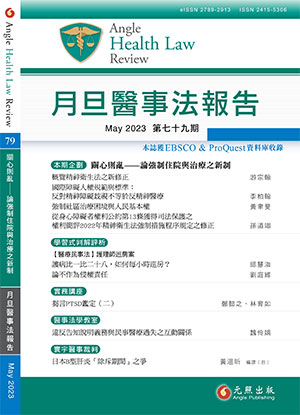日本B型肝炎「除斥期間」之爭患者敗訴(2022年札幌判決)【寰宇醫事裁判】 試閱
A Controversy over the Preemption Concerning the Hepatitis B in Japan: The Patients Defeat (Judgment in Sapporo in 2022)
原告A與B於嬰幼兒期,因共用針頭接種疫苗而感染B型肝炎,進而起訴日本政府國家賠償集體訴訟。原告分別在1990年與1991年e抗原陰性慢性肝炎發病,並惡化為肝纖維,嗣於2012年起訴。被告主張,原告起訴時距e抗原陰性慢性肝炎發病皆已超過20年,除斥期間已經過;原告則主張,雖除斥期間已經過,但肝炎已復發且惡化為肝纖維,則應視為新的損害發生並重新起計除斥期間。札幌地方法院認為,在e抗原陰性慢性肝炎發病之後,雖然出現輕、中度肺纖維化等病情惡化的狀況,但在未達肝硬化程度前,皆被視為與慢性肝炎同相同階段的病態,除斥期間的起算點仍維持「e抗原陰性慢性肝炎發病」之際。幌地方法院判決原告們敗訴,原告們的損害賠償請求權在提起本件訴訟時已超過除斥期間,權利即告消滅。
Plaintiffs A and B were infected with hepatitis B when they shared needles for vaccinations as infants and children, and filed a class action lawsuit against the Japanese government seeking national compensation. In 1990 and 1991, the plaintiffs developed E antigen-negative chronic hepatitis, which progressed to liver fibrosis, and sued the Japanese government in 2012. The defendant argued that the preemption period had expired because it was more than 20 years after the onset of the e-antigen-negative chronic hepatitis when the plaintiff filed the lawsuit; the plaintiff argued that although the pre-emption period had expired, the hepatitis had recurred and progressed to liver fibrosis, so the pre-emption period should be recalculated as if a new injury had occurred. The Sapporo District Court ruled: Although the disease worsens after the onset of E antigen negative chronic hepatitis, such as mild to moderate pulmonary fibrosis, it is considered to be in the same stage as chronic hepatitis until it reaches the level of cirrhosis, and the starting point of the exclusion period remains the onset of E antigen-negative chronic hepatitis. The Sapporo District Court therefore ruled against the plaintiffs, and the plaintiffs’ right to compensation was extinguished as the statute of limitations had expired by the time the lawsuit was filed.
127-134






